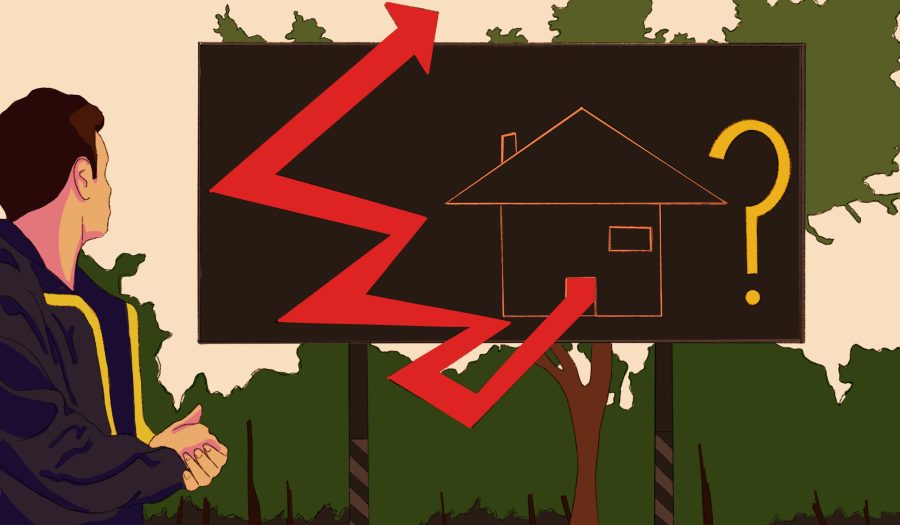As we enter the halfway point of the spring quarter, more and more students begin their housing searches. However, the issue of housing accessibility and affordability has once again become an unavoidable issue for many.
For next year, UC San Diego plans to offer 13,000 beds to undergraduate students. According to Associate Director of University Communications Leslie Sepuka, 5,372 continuing undergraduate students who submitted a continuing housing application were offered housing contracts. This group included students in UCSD programs with a four-year housing guarantee, new incoming first-year and transfer students, and returning second-year students.
Due to COVID-19, the university was not able to have triple housing in the 2020–2021 and 2021–2022 years. The lessening of guidelines to allow a limited number of triples has allowed the university to add 700 undergraduate beds.
Sepuka also noted that approximately 870 undergraduate second-year students are currently on the waitlist. As vacancies open up in the summer, more offers will be given based on students’ priority status and the date when they submitted their waitlist application.
Due to the lack of on-campus housing available, many students have begun the difficult search to find off-campus housing. Many students have never bought or rented a place before and are often confused about the process.
Additionally, San Diego rents can be a financial burden, as the average 2-bedroom apartment’s monthly rent can be $3,736. On the other hand, a double room on campus usually costs $1,170 per month per person.
When asked about their opinion on housing affordability, Thurgood Marshall College sophomore Arianna Andrade noted that housing near campus felt impractical for low-income students.
“Recently, I’ve begun working two, almost three jobs (while being a full-time student) to barely have enough to live somewhere near campus,” Andrade said. “I’ve considered moving to Tijuana and crossing daily just because it would be a lot more affordable for me to do so.”
To help lighten the burden, one of students’ first tasks when looking for off-campus housing is to find roommates. Often, students turn to Facebook groups to organize groups to find housing. One of the most popular groups, UCSD Student Off-Campus Housing, has 48.0K members and regular daily posts with listings or people searching for roommates.
With or without roommates, students will have to trek on a house hunt in communities surrounding campus, from nearby ones like La Jolla or University City to further off areas such as Clairemont.
The general consensus is that the further away from campus, the cheaper or better deals one will find. On Zillow, a two-room rental close to campus can be listed at $3,500 a month. Meanwhile, a two-room rental in Clairemont can be listed at $2,850 a month. However, that often comes at the expense of longer commutes, which isn’t easy for students who have to rely on public transportation.
Another major hurdle students face are landlords and applications. Students are often unsure about what responsibilities and powers landlords legally have. Additionally, applications may sometimes come with fees or security deposits that may confuse students.
To help navigate through the issues of renting, Student Legal Services (SLS) offers services to help students understand leases and security deposits. Located on the fifth floor of the Student Services Building, SLS offers free, confidential legal services to currently enrolled UCSD students and student organizations, ranging from legal assistance with forming a small business to helping students who are charged with crimes.
However, the biggest problem the SLS are approached with, according to SLS director Jon Carlos Senour, would be students’ issues with security deposits and leases.
In an interview with The UCSD Guardian, Senour stated that a good way students can ensure they’ll receive their security deposits back is to take pictures of the rental’s condition when moving in, and then take them again when they move out. In the situation that a landlord refuses to give back the security deposit, these pictures could be crucial to get it back.
Additionally, Senour suggested that when students send in their applications, they provide as much as they can to prove that they will be able to pay the rent every month. These documents can include a physical copy of the financial aid students can receive, or getting a statement from the Residential Life office for their dorm rooms. Additionally, students should try to invest in the best renter’s insurance to help cover some costs.
Senour also suggested that parents can write letters stating that they will be able to help their children pay rent. However, he strongly discouraged cosigners or guarantors due to a Californian rule of law called “joint and several liability.”
“Joint and several liability is a fancy way of saying that each tenant in a case can be held 100 percent responsible for the tenants collectively,” Senour explained.
For example, if one out of three roommates is not able to pay their monthly rent, the landlord is allowed to evict all three of them, not only the roommate who didn’t pay because they all collectively signed a contract.
“And if you have a cosigner — a parent or guardian — that person is going to be responsible for everybody. In other words, not just their student, but everybody on the lease,” Senour said. “The landlord can take action and absolutely will take action against all tenants, even the ones who presumably are not breaking the lease.”
Other than SLS, UCSD offers multiple resources to help students find off-campus housing. The main resource is the Off-Campus Housing Office, where students can schedule housing consultations, receive help with first-time lease signings, and find other resources for moving in and out. The office’s website also features listings, house hunting tips, and a roommate-finder tool.
Other resources the university offers are websites with off-campus house hunting tips, off-campus rental forms, and guidelines on landlord, tenant, and roommate responsibilities. Students can also join the Associated Students Office of Food and Housing resources Facebook page to find other students who are looking for roommates or rooms.
Finally, UCSD’s Basic Needs Center has created a student food and housing guide available for students. Additionally, the Basic Needs Hub provides housing resources, food security, and financial wellness workshops. They also help connect students to transitional housing and short-term emergency housing.
However, some students argue that this is not enough support. When asked if UCSD does enough to help students, Andrade stated that they believe the university doesn’t care enough about their students.
“They took away the 2-year housing guarantee, and the only reason I found housing was because I lived on campus during the year where everything was remote,” Andrade said. “I think UCSD’s administration has been a mess these past two years that I’ve gone here, and I wish they would do more for their students instead of just building more random lecture halls.”
For more information about California tenants’ rights and responsibilities, please refer to this guide written by the California Department of Real Estate.
Artwork courtesy of Ava Bayley for the UCSD Guardian.


















nytimes crossword • Jul 4, 2022 at 7:32 pm
Thank you for your post. I have read through several similar topics! However, your article gave me a very special impression, unlike other articles. I hope you continue to have valuable articles like this or more to share with everyone!
Jhonson7 • May 31, 2022 at 7:06 am
The cost of college has increased dramatically over the past few decades, and students are struggling to pay for it. It’s not just tuition that has gone up, though. The cost of housing has also soared, making it increasingly difficult for students to afford housing while they attend college. I suggest students to visit https://write-my-essay.online/write-my-personal-statement/ website and get help in writing their personal statement on special discounts and save money to pay other educational expenses.